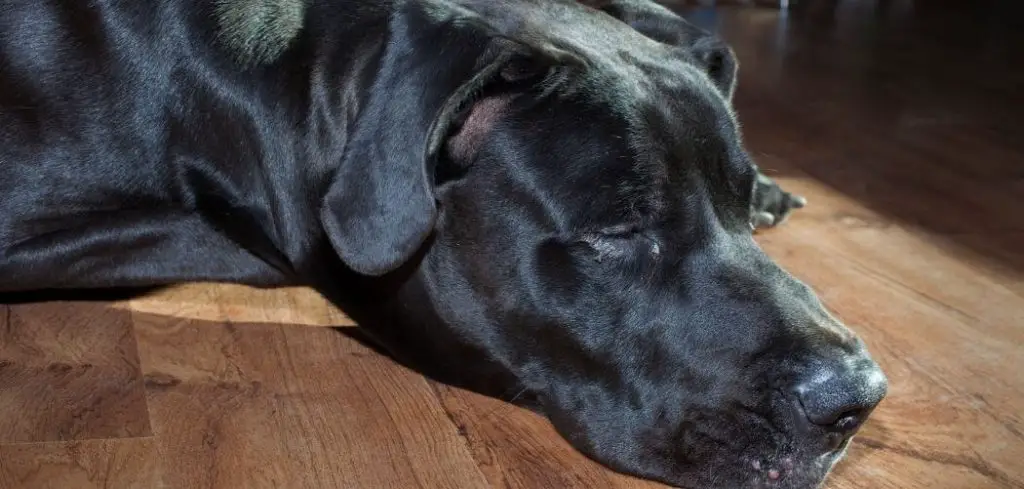Panting in dogs can be normal after exercise or excitement, but when it happens after giving a medication like Apoquel, it can be concerning for owners.
Panting combined with medication use may signal a side effect, an underlying health issue, or an unrelated condition that coincidentally appears after dosing.
We outline the common reasons for dog panting after Apoquel, what you can do at home, and when to seek veterinary help.
Table of Contents
Apoquel for Dogs – What It Is and How It Works
Apoquel is a prescription medication used in dogs to relieve itching and inflammation caused by allergic skin conditions. Veterinarians commonly prescribe it for dogs suffering from atopic dermatitis (environmental allergies) or flea allergy dermatitis.
Unlike traditional antihistamines, Apoquel works by targeting specific enzymes in the dog’s immune system that trigger itching and inflammation, providing relief within hours.
It’s not a steroid, so it generally has fewer long-term side effects than corticosteroids, but it should still be used under veterinary supervision. Apoquel is typically given in tablet form once or twice daily, depending on the dog’s needs and the vet’s instructions.
While it can greatly improve a dog’s comfort and quality of life, Apoquel is not a cure for allergies — it manages the symptoms, and the underlying cause of the allergy should still be addressed.

Dog Panting After Apoquel — Why It Happens
Apoquel is generally well tolerated in dogs, but some may experience panting due to mild side effects, allergic reactions, or unrelated health problems that become noticeable after starting the medication.
In some cases, panting may be due to anxiety from the vet visit or stress during medication administration. Other times, it may be linked to pain, heat stress, or underlying organ disease that coincides with starting Apoquel.
Because panting can range from a harmless reaction to a serious medical sign, it’s important to understand the possible reasons and monitor for additional symptoms.
Common Causes of Dog Panting After Apoquel
Mild Medication Side Effects
Apoquel works by modulating the immune system to control itching and inflammation. While many dogs tolerate it well, a small number may experience mild side effects like panting.
Panting in this case may occur within an hour of administration and resolve on its own. You might also notice slight restlessness or increased thirst.
Although usually harmless, persistent or worsening panting warrants further investigation.
Read more: Dog Panting After Antibiotics (Here’s why)
Allergic Reaction to Apoquel
While uncommon, some dogs can have an allergic reaction to Apoquel. Panting may be part of this response, alongside symptoms like swelling of the face, hives, drooling, or vomiting.
In allergic reactions, panting is caused by the body’s stress response and potential respiratory involvement. This is a medical emergency and needs immediate veterinary attention.
Pain or Discomfort from Underlying Conditions
Sometimes, panting after Apoquel isn’t due to the drug itself but to pain or discomfort from an underlying problem.
Dogs with arthritis, dental disease, or internal discomfort may pant more after physical handling or stress related to giving medication.
This is especially relevant for senior dogs or those with pre-existing conditions.
Heat Stress
If your dog receives Apoquel after outdoor activity or in a warm environment, panting may simply be a sign of cooling down.
Dogs regulate body temperature through panting, and mild environmental heat stress can overlap with medication timing, making it appear drug-related.
Monitoring your dog’s environment can help rule this out.
Heart or Respiratory Disease
In some cases, panting after Apoquel could be unrelated to the drug but instead a symptom of heart disease, lung problems, or other serious conditions. The timing may be coincidental but should not be ignored.
If panting is accompanied by coughing, rapid breathing at rest, weakness, or blue gums, urgent veterinary assessment is needed.
Anxiety or Stress
Some dogs find the process of taking medication stressful. Even if Apoquel itself doesn’t cause panting, the act of restraining, handling, or changing their routine can trigger stress-induced panting.
Stress panting usually resolves once the dog calms down, but frequent episodes should prompt a discussion about reducing anxiety during medication.
What to Do If Your Dog Is Panting After Apoquel
First, stay calm and observe your dog closely. Check if the panting subsides within 30 to 60 minutes. Ensure your dog is in a cool, comfortable environment and has access to fresh water.
If panting is mild and your dog is otherwise acting normally, you can monitor at home for changes.
Avoid giving additional doses until you’ve confirmed with your veterinarian that it’s safe to continue.
Document when the panting started, how long it lasted, and any other symptoms.
This information can help your vet determine if Apoquel is the cause or if another condition is to blame.
If panting is severe, persistent, or accompanied by other worrisome signs, seek veterinary care immediately.
When to Call or Visit Your Vet
Contact your vet right away if your dog shows signs such as:
Swelling of the face or throat
Difficulty breathing
Excessive drooling or vomiting
Weakness or collapse
Blue or pale gums
Even without these signs, if panting continues for more than an hour or becomes more frequent after each Apoquel dose, a veterinary evaluation is needed.
Your vet may recommend adjusting the dosage, switching medications, or running diagnostic tests to rule out other health problems.
Read more: Dog Panting After Anesthesia (Should you worry?)
Key Takeaway
Panting after Apoquel can be harmless or it can signal a serious problem. While mild, short-lived panting may resolve without intervention, persistent or severe panting requires prompt veterinary attention.
By monitoring your dog closely, documenting symptoms, and communicating with your veterinarian, you can help ensure your dog stays safe while receiving the benefits of Apoquel for allergy relief.
